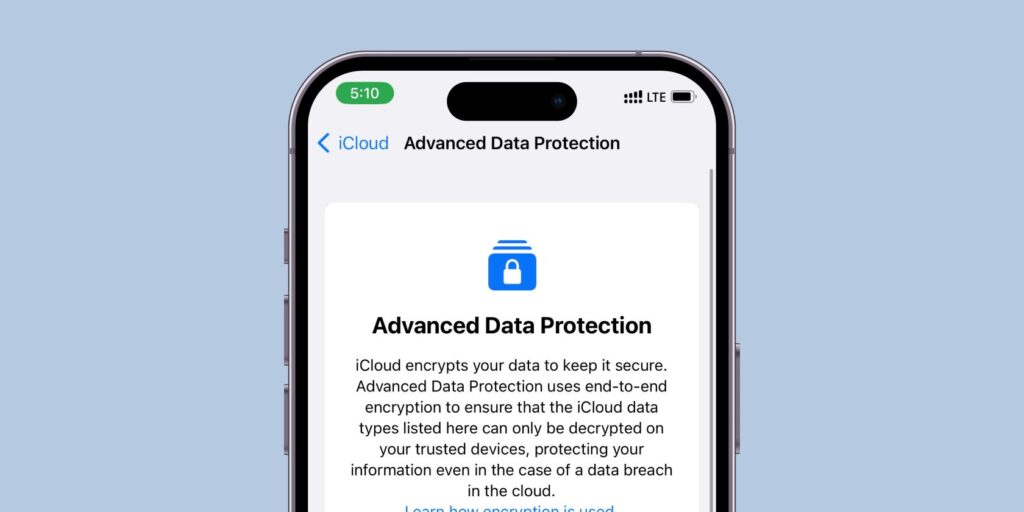
Audience
- Sentiment: Concerned
- Political Group: Privacy advocates
- Age Group: 18-35
- Gender: All genders
Overview
- The UK government has requested Apple to create a backdoor for iCloud, raising privacy concerns.
- Apple’s Advanced Data Protection (ADP) enhances security by using end-to-end encryption.
- Users are advised to enable security features, use strong passwords, and be cautious with their data sharing.
The Growing Concern Over iCloud Security: What You Need to Know
In today’s digital world, security is a big deal, especially when it comes to keeping your personal data safe. Imagine all the photos, documents, and messages you store in iCloud—your phone’s digital vault. Now, what if someone from the government could just waltz in and check out everything you keep there? This is becoming a serious concern, especially after recent events in the UK, where the government has asked Apple to create a backdoor for iCloud. Let’s break down what’s happening, why it matters, and what you can do to protect yourself.
Understanding iCloud and Encryption
First, let’s get to basics. iCloud is Apple’s cloud storage service. It helps you store your stuff so you can access it from your iPhone, iPad, and even your computer. But just thinking about storing data on someone else’s server can be a bit scary, right? That’s where encryption comes into play.
Encryption is like putting your information in a locked box. Only you (and anyone you share the key with) can unlock it. Apple’s Advanced Data Protection (ADP) is a feature that uses end-to-end encryption, meaning that your data is scrambled in such a way that even Apple can’t read it. This is great news for you, as it helps keep your data private. It’s your personal stuff, and it should stay that way.
The UK Government’s Demand
Now, let’s take a look at the UK government’s recent demand for Apple to allow intelligence and law enforcement agencies access to iCloud content through a backdoor. A backdoor is like a secret entrance to a locked building. This means that, while normal users (like you) would still have their data encrypted, the government could sneak in and access your information whenever they want.
This request raises serious concerns. While law enforcement argues that access to data can help them catch criminals and protect citizens, this also undermines the very foundation of personal privacy. If the government has a way to peek into your private life, where do we draw the line? What if they decide to abuse this power? These are questions that many people are wrestling with right now.
Apple’s Response
Apple’s stance has typically been strong when it comes to user privacy. They pride themselves on offering the best security features. With the introduction of ADP, Apple took huge steps in ensuring that users felt safe storing their most sensitive information in the cloud. However, this new demand greatly complicates things. If Apple agrees to create a backdoor, it could lessen the effectiveness of the encryption and ultimately risk the privacy of not only UK users but also users around the world.
Think of it this way: if Apple opens up a secret door, even the best security systems might not keep your data completely safe. The potential for hacking, misuse, or even wrongful surveillance increases significantly. No one wants to feel like they’re living in a fishbowl, where every little detail of their life is being watched.
The Impact on Users
So, what’s at stake for you, the user? Well, if Apple succumbs to pressure and creates a backdoor, your data might no longer be as secure. Even though you might be mindful about what you share and how you share it, this could fundamentally change the landscape of user privacy. You may find yourself in a situation where your pictures, private conversations, and important documents are not entirely private anymore.
We live in a world where so much of our life is online, from social media posts to documents for school or work. When we share something online, we usually assume it will stay private. But when governments start demanding access, it puts that assumption at risk. It’s essential to keep in mind that not only are you sharing your data, but with a backdoor, it opens the floodgates for unauthorized access too.
Prioritizing Encryption and Security
As this debate rages on, it’s crucial for users to prioritize their digital security. Here are some practical steps you can take to protect your data while using iCloud:
- Enable Advanced Data Protection (ADP): If you haven’t already, turn on ADP. This feature enhances your security by ensuring that only you have access to your iCloud data.
- Use Strong Passwords: Make sure to create complex passwords for your Apple ID, and consider enabling Two-Factor Authentication (2FA) for an added layer of security.
- Think Before You Share: Always be cautious about what you post or store online. If it’s something you wouldn’t want anyone else to see, consider if you need to store it on iCloud at all.
- Stay Updated: Keep your devices and apps updated. Software updates often include important security patches that help protect your data.
- Explore Alternative Storage Options: If you are particularly concerned about privacy, you might want to explore other cloud storage services that offer strong encryption and do not have the same governmental pressures as Apple.
The Future of Privacy
The conversation about privacy is only going to become more pressing as technology advances. If Apple—one of the largest tech companies in the world—can be influenced to create a backdoor by government demands, what does this mean for smaller companies or apps? There’s a growing sentiment that tech companies need to stand firm against these pressures to protect users.
Moreover, it’s worth pondering how government laws and regulations must keep pace with technology to ensure user rights and privacy protections are preserved. Many believe that the right to privacy should be a top priority in the digital age. It’s a modern issue that young people like you and me must engage with as we increasingly rely on digital platforms for our education, communication, and entertainment.
Final Thoughts
In conclusion, the UK government’s demand for a backdoor into iCloud raises critical questions about privacy and personal security. It’s essential for users to stay informed and proactive in safeguarding their information.
How do you feel about the idea of the government potentially accessing your personal data? Are you concerned that your privacy might be compromised, or do you believe that security is a higher priority? I’d love to hear your thoughts! Share your opinions in the comments below!






